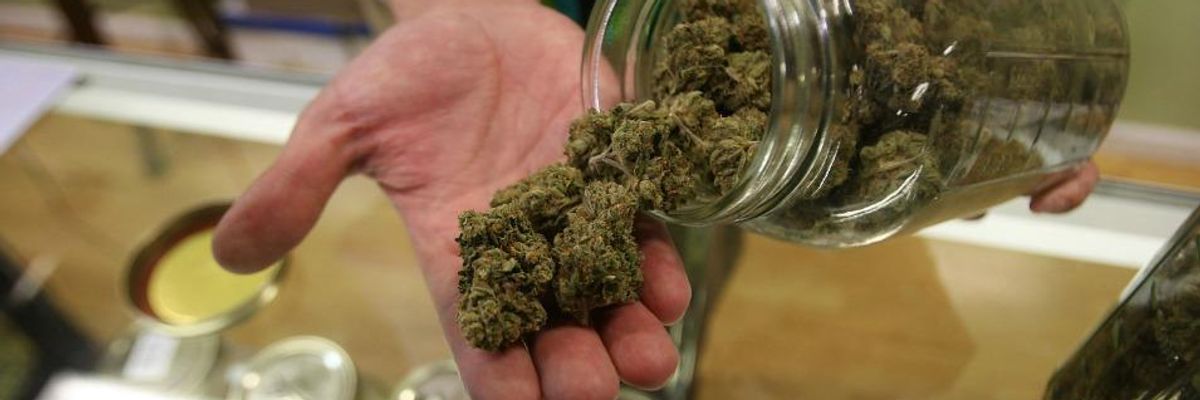Though a key argument for legalizing marijuana in the United States is that it would put a tremendous and necessary dent in the domestic and global failure known as "the War on Drugs," a new analysis out Wednesday reveals that federal legalization could also raise more than $130 billion in tax revenue by 2025 while also creating more than 1.1 million new jobs.
The new study was published by New Frontier Data--a research and marketing firm whose stated mission is to "inform cannabis-related policy and business decisions through rigorous, issue-neutral and comprehensive analysis of the legal cannabis industry."
As the Drug Policy Alliance has shown, the criminalization regime and enforcement of keeping marijuana and others drugs illegal costs the U.S. government more than $50 billion annually--that includes the outrageous costs of imprisoning tens of thousands of people for nonviolent drug offenses.
Meanwhile, according to New Frontier CEO Giadha Aguirre De Carcer, the government would stand to do very well if marijuana, as has been shown in Washington state and Colorado, was taxed as a legal commodity. "The three most common business taxes that any standard business pays to the federal government are federal business taxes, payroll taxes and sales taxes," De Carcer explained. "If cannabis businesses were legalized tomorrow and taxed as normal businesses with a standard 35% tax rate, cannabis businesses would infuse the U.S. economy with an additional $12.6 billion this year."
As opposed to the current patchwork of states that have legalized either medical marijuana, its recreational use, or both, the analysis looked at what could happen if the U.S. government made it legal to sell marijuana nationwide and included these major findings:
- If full legalization occurred in all 50 states today, there would be an excess of 782,000 jobs, and would increase to 1.1 million jobs by 2025.
- Full legalization would result in more legal businesses participating in the market, more consumers participating in the legal market, and more employees on official payrolls, resulting in $4 billion in payroll taxes. By 2025, payroll deductions would increase to $5.9 billion.
- Assuming a sales tax at the federal level was implemented at 15%, the total tax revenues from 2017-2025 would theoretically be $51.7 billion. This amount of revenue would be entirely new revenue to the U.S. Treasury, as there are currently no federal sales or excise taxes.
- By combining the business tax revenues, the payroll withholdings based on the theoretical employment required to support the industry, and the 15% retail sales tax, one can calculate the total federal tax revenue potential of legalization: The combined total is estimated to be $131.8 billion.
- The difference between the current structure and the theoretical model is a $76.8 billion increase in federal tax revenues.
The new data comes in the wake of polling that shows historic levels of support for marijuana legalization nationwide. In October of 2017, a Gallup survey found that 64 percent of Americans now favor legal marijuana--the highest level ever recorded. It's also an issue that receives backing from people across the political spectrum. According to the Gallup poll, a majority of Republicans (51%) are in favor while Independents (67%) and Democrats (72%) support legalization at even higher levels.

